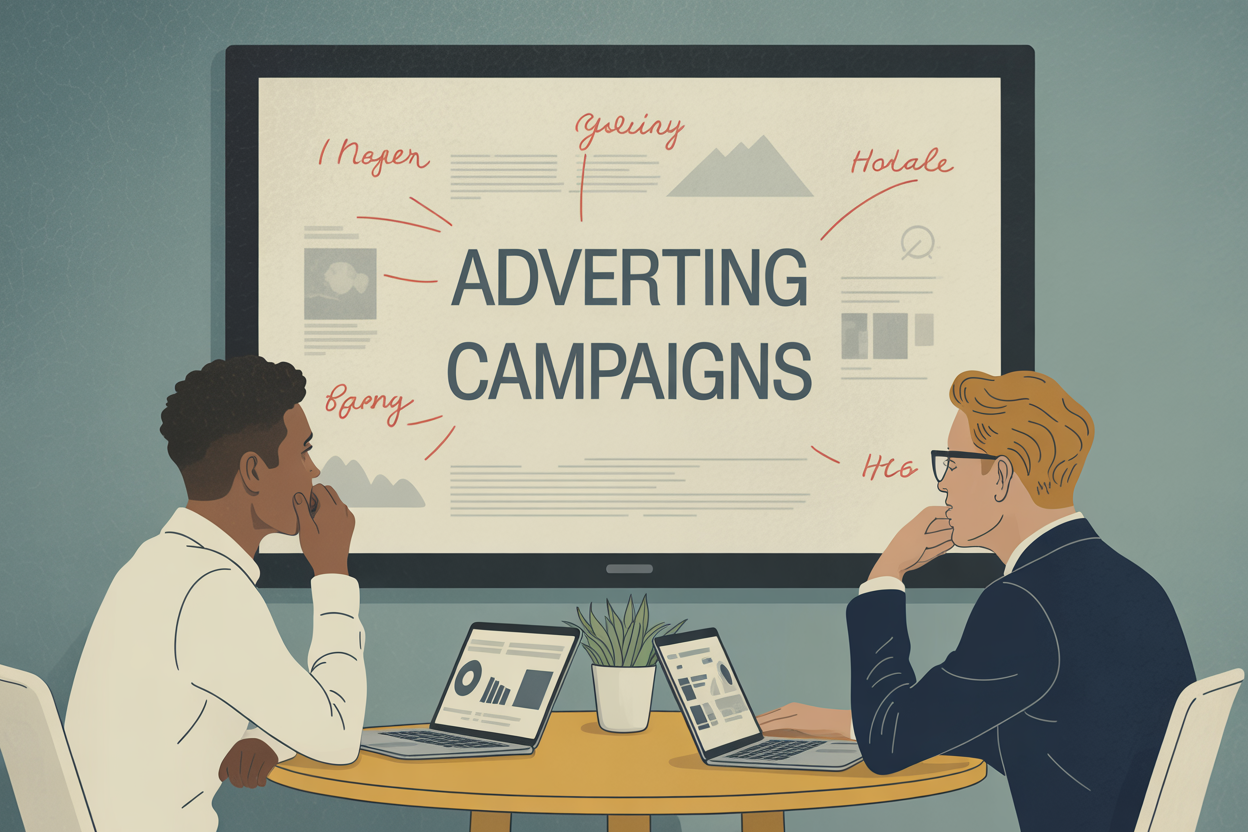Consumer fraud losses topped $12.5 billion in 2024, up 25% from the year before. And guess what? Investment scams led with $5.7 billion in losses. This isn't just about following rules – it's about protecting real people from real harm.
We know marketing compliance can seem overwhelming, especially in heavily regulated industries like finance and fintech. But it doesn't have to be. Let's break down what you actually need to know about truth in advertising laws, why they matter to your business, and how you can stay compliant without sacrificing creativity.
Why Advertising Compliance Matters in Fintech & Finance

The numbers tell a pretty clear story. Consumers reported losing more than $12.5 billion to fraud in 2024, jumping 25% from the prior year. Of that, investment scams caused $5.7 billion in losses. These figures show that deceptive financial promises are costing the public a lot of money.
Regulators have definitely noticed, and they're taking action. For example, fintech app Cleo AI recently agreed to pay $17 million to settle FTC allegations that it misled consumers about how much cash they'd get and how fast they'd get it. The FTC also secured over $17 million in refunds for users of another app, Brigit, over deceptive "no-fee" loan claims.
These penalties make it clear that truthful marketing is now a top compliance priority for banks, fintechs, and investment advisors. And with good reason – when people's finances are at stake, accuracy matters.
What Is "Truth in Advertising" and Why Does It Matter?

Truth in advertising laws require all promotional claims to be truthful and evidence-based. Under Section 5 of the FTC Act, advertisers must have a reasonable basis (often scientific or factual proof) for any objective claims they make. These standards apply everywhere an ad appears – whether in a TikTok video, a newspaper, or on a fintech app's website. Simply put, no matter the medium, you can't lie or mislead in an ad.
Ensuring truth in ads is critical because deceptive marketing erodes consumer trust and can lead to real harm. Regulators focus especially on claims affecting consumers' health or finances, where false promises can leave people worse off.
Consumer trust is already pretty shaky – only 50% of consumers said in 2023 that they trust the brands they use. Honest advertising helps build that trust. But a single false claim (for example, a finance app hiding fees) can permanently damage your firm's reputation and customer relationships.
In highly regulated sectors, truth in advertising isn't just a legal box to check – it's basic to maintaining credibility with both clients and regulators.
How Truth-in-Advertising Laws Protect Consumers
Truth-in-advertising laws give agencies like the FTC tools to act quickly against scams and misleading promotions. When the FTC finds fraudulent or deceptive ads, it can go to federal court for orders to stop the deceit, freeze the perpetrators' assets, and secure compensation for victims.
These tools work: in 2024 alone, the FTC sent $337.3 million in refunds to consumers harmed by unlawful practices. In one case, the agency recovered $99.3 million for people who bought sham health plans sold with false ads. This money back shows the real consumer benefit of enforcing advertising laws.
Beyond refunds, enforcement has a preventive effect. Regulators often obtain permanent injunctions barring bad actors from similar marketing in the future. For instance, the FTC filed 43 complaints in FY 2024 and obtained 93 permanent injunctions against companies and individuals for deceptive marketing.
Such actions not only help current victims but also signal to the industry that false or unsubstantiated claims won't be tolerated. Over time, this leads to higher standards: companies think twice about that "too good to be true" claim if they know it could result in lawsuits or even personal liability for executives. In sectors like finance where consumers' life savings are at stake, these laws are a critical shield against fraud and misrepresentation.

Examples of Misleading Advertisements and Their Impact
A recent FTC case against Cleo AI, a UK-based fintech app, shows what happens when advertising goes wrong. The app promised users quick, substantial cash advances ("$100 with no fees, instant access!"), but actually misled users about how much money they'd receive and how fast they'd get it. In March 2025, Cleo AI agreed to a $17 million settlement with the FTC, with that money going to refund affected consumers. This case shows how a flashy fintech marketing campaign ("free money" pledges) can cross into deception – and result in multi-million dollar penalties and damaging headlines.
Even established financial firms have had problems. In early 2025, the CFPB fined fintech company Wise (formerly TransferWise) about $2.5 million for misleading advertising around its money transfer fees. Wise's promotions implied "no fees" or understated costs, but the CFPB found the company failed to disclose exchange rates and other charges, causing customers to pay more than advertised. Along with the penalty, Wise had to refund $450,000 to consumers and publicly correct its practices. The impact: a damaged reputation and a clear message to the industry that transparency in pricing claims is non-negotiable.
It's not just fintech apps – investment advisers have been hit too. In a September 2024 sweep, the SEC charged nine RIAs with disseminating advertisements that contained untrue claims and lacked required disclosures. Some firms touted misleading "top advisor" ratings (one even falsely claimed membership in a non-existent "prestigious" organization), while others posted "conflict-free advice" promises they couldn't substantiate. The outcome: all nine firms settled and paid a combined $1.24 million in penalties. This enforcement was a clear warning to the RIA community that even subtle exaggerations or omitted facts in marketing materials can lead to public sanctions and fines.
How Does the FTC Regulate Truth in Advertising?

The FTC is the main federal agency policing advertising truthfulness. Under its FTC Act authority, the Commission can investigate ads and take action if they're "unfair or deceptive." The FTC applies the same basic rules to all ads – whether on a billboard, a website, or an app: claims must be true and not misleading, and advertisers must have evidence to back up objective statements.
To enforce this, the FTC uses various tools. It often starts with warning letters or cease-and-desist orders for less serious offenses. But in serious cases, the FTC will file lawsuits in federal court seeking injunctions and monetary relief. Even after a 2021 Supreme Court decision limited some refund powers, the FTC still obtained $267.6 million in redress for consumers in FY2024 through settlements and other means. The agency brought 43 enforcement actions in FY2024 alone.
The FTC keeps up with emerging advertising tactics, including those involving artificial intelligence. In late 2024 it launched "Operation AI Comply," a law-enforcement sweep targeting deceptive claims involving AI. As FTC Chair Lina Khan put it, "Using AI tools to trick, mislead, or defraud people is illegal... there is no AI exemption from the laws". Cases in this sweep included a company selling a bogus "AI lawyer" service and marketers using AI to fabricate fake customer reviews. The FTC's message is clear: whether a claim is made by a human or generated by AI, it must still be truthful.
The FTC has also authorized compulsory process (subpoenas, civil investigative demands) to scrutinize AI-related products and their advertising. Additionally, the FTC regularly updates its guidance (such as the Endorsement Guides and disclosure rules) to address new platforms like social media, influencer marketing, and now AI-driven endorsements. Bottom line: The FTC actively adapts its regulatory oversight to new tech, ensuring that truth-in-advertising principles carry forward into the digital era.
Legal Responsibilities of Advertisers (and Others) Under Truth-in-Advertising Laws

The law places responsibility for truthful advertising on every party involved in a promotion, not just the company whose product is advertised. The FTC's updated Endorsement Guides (revised 2023) make this explicit: advertisers, endorsers and intermediaries like advertising agencies or PR firms can all be held liable for a deceptive ad.
For example, if a brand hires an influencer who makes false claims or fails to disclose they're paid, both parties face FTC action. Similarly, an ad agency or marketing consultant that knowingly creates misleading content could be on the hook. This broad allocation of liability means everyone in the marketing chain has a duty to ensure claims are accurate and compliance boxes are checked – from proper disclosures (like #Ad tags or fine-print qualifiers) to having substantiation on file for any factual assertions. Recent FTC enforcement has driven this point home by pursuing not just companies but also bogus review brokers and influencer networks that facilitated deceptive endorsements. Truth-in-advertising is a "team sport" – all involved are expected to play by the rules, or else face legal consequences.
Advertisers in highly regulated fields shoulder additional compliance burdens on top of FTC rules. In finance, for instance, banks and lenders must follow CFPB and Federal Reserve advertising regulations (such as clear APR disclosures in loan ads). Fintech firms offering securities or investment advice fall under SEC and FINRA rules. The SEC's new Marketing Rule (effective 2021-2022) for investment advisers is a prime example: it tightly governs performance advertising, testimonials, and use of endorsements by RIAs. Under this rule, an investment adviser cannot cherry-pick results or present hypothetical performance to the public without extensive disclaimers and a reasonable belief the content is relevant to the audience. Advisors must also maintain documentation to back up any performance or ranking claims.
The SEC has signaled vigorous enforcement – in April 2024 it penalized five advisory firms for advertising "hypothetical performance" without proper policies and proof, resulting in settlements totaling $200,000 in fines. And in a broader sweep, nine advisory firms were fined $1.24 million for touting misleading accolades or "conflict-free" services without basis. Trend: Regulators are holding companies accountable not just for overt falsehoods, but for omissions and implied claims as well. For businesses, this means legal responsibility extends to having compliance systems in place – training staff, vetting content, and monitoring marketing practices – to ensure no law is breached by their advertising.
Compliance and Legal Advice for Business Owners
Skimping on advertising compliance can be a very expensive mistake. Studies find that the cost of non-compliance (fines, lawsuits, remediation) is about 2.7 times higher than the cost of maintaining compliance. In other words, every dollar "saved" by not investing in compliance can lead to nearly three dollars in penalties and business losses down the line. This includes not only regulatory fines (which in finance can reach millions per violation) but also indirect hits like lost revenue during legal disputes and damage to customer loyalty. In fact, companies globally lose an average of $4 million in revenue from a single significant compliance lapse. Especially in fintech and banking, where regulators like the FTC, CFPB, and SEC are actively monitoring ads, the ROI of compliance is clear: it's far cheaper to do it right upfront than to clean up an enforcement mess later.

To avoid missteps, experts urge businesses to bake compliance into their marketing process. This means involving legal and compliance teams early and often when creating ads. For instance, having an attorney or compliance officer review ad copy, customer-facing webpages, and AI-generated content before it goes live can catch problematic claims (unsubstantiated superlatives, missing disclaimers, etc.) before they do harm. Such upfront vetting has become standard in regulated industries – many RIAs now require compliance officer sign-off on every marketing piece, a practice reinforced by SEC actions against those that failed to do so.
Companies are also turning to technology and AI-driven compliance tools to help. Modern compliance software can automatically scan marketing materials for forbidden phrases, missing disclosures, or high-risk wording, flagging issues in real time. This is crucial as firms scale content output (often via generative AI). According to a 2023 McKinsey survey, 13% of organizations have already hired AI-specific compliance specialists to oversee the use of AI and automated systems in their operations – a sign that businesses see value in marrying tech solutions with legal expertise. The bottom line for business owners: investing in strong compliance processes (and the tools or counsel to support them) pays off by preventing costly legal violations, preserving reputation, and even streamlining marketing workflows (by providing clear guidelines on what is and isn't allowed). As one industry saying goes, "Compliance may be expensive, but try non-compliance – that's priceless (in the worst way)."
How Can Customers Spot and Report False Advertising?

Financial consumers should stay vigilant and scrutinize advertising claims – especially those that seem too good to be true. Common red flags include: promises of guaranteed returns or "free money" with no risk, "no fees" or "0% interest" claims that hide catches in fine print, and testimonials or endorsements that feel overly biased. For example, the FTC took action against a cash advance app that hyped "no interest" loans but then charged hidden fees, and against a crypto firm that falsely claimed customer deposits were FDIC-insured.
Consumers should be wary of ads using urgency or FOMO tactics ("limited time offer to double your investment!") and those lacking clear disclosures or contact information. Even slick production doesn't guarantee honesty – as the FTC notes, deceptive marketers might fabricate before-and-after photos or fake reviews using AI. A healthy dose of skepticism is warranted: if an ad's claims stretch belief or aren't backed by specifics, consider that a big warning sign. One practical tip is to cross-check any startling offer with independent sources (e.g. is that fintech app actually endorsed by regulators? Does that investment's prospectus back up the advertised returns?). Spotting false ads often comes down to asking, "Where's the evidence?" – if an advertiser can't or won't provide it, consumers should think twice.
Consumers play a crucial role in bringing false advertising to light. If you suspect an ad is misleading or fraudulent, you can report it to the FTC (via ReportFraud.ftc.gov or call centers) or to your state's Attorney General or consumer protection office. These complaints matter: the FTC's Consumer Sentinel Network, which aggregates reports from the public, received over 6.47 million consumer reports in 2024 (about 40% of them fraud-related). Those reports feed law enforcement investigations at the FTC and across dozens of partner agencies. In 2024, for example, consumers submitted roughly 2.6 million fraud/scam reports and in 38% of those cases the person reported losing money – data that helped the FTC target the worst offenders.
While not every complaint leads to an immediate case, the FTC does spot patterns; a cluster of similar complaints about a company can trigger an investigation. The good news: enforcement does yield results. The FTC publicized that in 2024 it filed numerous actions to stop scams and deceptive marketing, and ultimately returned $337 million to defrauded consumers that year. Consumers who report bad ads might not always hear back, but their tip could be the reason a fraudulent scheme gets shut down. Additionally, customers can seek resolution through the BBB's advertising division or, in some cases, private lawsuits if they were significantly misled. Remember: if you see an ad that you believe crosses the line, speaking up not only protects you but can protect others – it's a way of crowdsourcing accountability, prompting authorities to investigate and keep the marketplace honest.
What Role Do Attorneys Play in Truth-in-Advertising Compliance?

Attorneys are indispensable on the front lines of advertising compliance. In industries like fintech, banking, and investments, many companies now involve their legal teams early in ad and campaign development. An advertising or compliance attorney's job is to vet the content for any statement that could be deemed false, misleading, or non-compliant with regulations (FTC Act, SEC rules, etc.). This includes checking that all claims are substantiated by evidence, required disclaimers are present (for example, the standard "past performance is not indicative of future results" on investment promos), and that promotions adhere to specialized rules (like FINRA's guidelines for broker-dealers).
By catching issues before ads go live, attorneys help businesses avoid the fate of those hit in regulatory sweeps. The importance of this role has only grown – in fact, brands were urged in 2024 to "revisit marketing compliance strategies" to minimize the risk of potential class actions, regulatory enforcement actions, and competitor challenges. This kind of advice typically comes from legal counsel who monitor the latest enforcement trends. It's not uncommon now for large financial firms to have dedicated advertising review committees (often led by in-house counsel) that must sign off on marketing materials. Such proactive legal oversight is a key reason why many firms haven't faced the penalties that their less cautious peers have.
When false advertising disputes do arise, attorneys take center stage in resolving them – whether on the side of the regulators or the company. The FTC, for example, employs teams of attorneys in its Bureau of Consumer Protection who investigate ad practices and litigate cases in court. In FY 2024, FTC attorneys filed 43 complaints in federal court against companies for deceptive marketing, winning injunctions and consumer redress orders in those cases. State Attorneys General also have legal divisions pursuing false advertising under state laws, often collaborating in multi-state actions.
On the flip side, if your company is accused of a misleading ad, you'll likely engage defense attorneys (or outside counsel) to manage the response – from handling FTC inquiries or SEC examinations, to negotiating settlements or fighting a lawsuit. Companies have spent significant sums in these legal battles. Consider that aside from fines like the $17 million Cleo AI paid, there are also the legal fees and compliance overhauls that come with settling such cases (Cleo AI's settlement, like many, required the firm to hire compliance monitors and attorneys to ensure future adherence).
In the private arena, attorneys also prosecute Lanham Act cases, where competitors sue each other over false advertising claims – these can result in damages, injunctions, and costly corrective advertising. One trend worth noting is the rise of class-action lawsuits by consumers alleging misleading marketing (for example, suits over "organic" labels or hidden fees), which frequently end in multimillion-dollar settlements – again, a domain where seasoned advertising litigators are critical.
The need for advertising compliance has even spurred innovation like automated legal review tools – often rolled out under attorneys' guidance. Some firms now utilize AI-driven compliance platforms that flag risky language, but even these are typically overseen by legal experts (hence the hiring of AI compliance specialists by 13% of companies to bridge tech and law). The central takeaway is that attorneys don't just react to problems; they actively shape the compliance environment. They author internal policies ("Dos and Don'ts" for marketing teams), train staff on truth-in-advertising standards, and keep leadership apprised of new laws.
In regulated sectors, an attorney's sign-off on an ad can be as crucial as the creative director's. And if things go wrong, it's often attorneys who help remediate – negotiating with regulators for lesser penalties or cooperating to fix issues (which can reduce fines, as seen when some RIAs got reduced SEC penalties by taking corrective steps early). Attorneys serve as both the guardrails and the advocates in truth-in-advertising: they try to prevent companies from crashing through legal barriers, and if a crash happens, they help pick up the pieces and get the company back on the compliance road.
Final Thoughts
With regulatory bodies like the FTC ramping up enforcement (remember that $337.3 million returned to consumers in 2024 alone) and penalties reaching into the millions, the risks of non-compliant marketing are higher than ever. But most marketing teams don't have the luxury of running every piece of content by legal before publishing.
That's where technology comes in. Modern AI tools can be your first line of defense, automatically scanning content across all channels to identify potential compliance issues before they become problems. Think of it as having a compliance expert looking over your shoulder 24/7.
We built Luthor to be that expert – an AI-powered compliance platform that continuously monitors your marketing content across websites, emails, social media, and ads to catch potential regulatory issues in real time. It's not about replacing your compliance team. Rather, it's about freeing them from repetitive checks so they can focus on higher-value work.
By automatically flagging non-compliant phrases, missing disclosures, and problematic claims based on current SEC and FINRA guidelines, Luthor helps you maintain compliance more efficiently while creating a clear audit trail of all reviews and changes.
If you're tired of the constant worry about whether your latest campaign might trigger regulatory scrutiny, or if your compliance team is overwhelmed with manual reviews, we'd love to show you how Luthor can help reduce risk while saving time and resources.
Want to see how it works? Request demo access today and learn how AI can transform your approach to marketing compliance.




